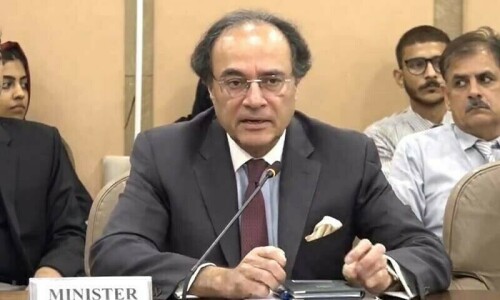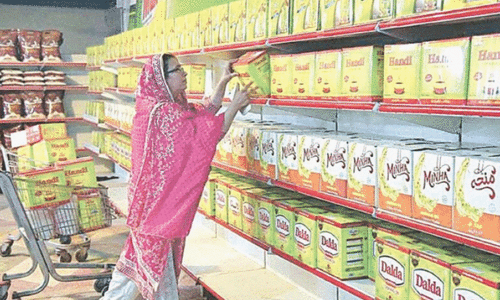The JDW Sugar Mills Limited — a company listed on the country’s stock exchange — is the largest producer of sugar in the country. Measured by whatever yardstick, the production, sales, profitability, dividend payout or stock price, the JDW Sugar Mill has outperformed its peers.
The company has two mills (units) in Sadiqabad, Rahim Yar Khan in Punjab and another in Ghotki, Sindh.
According to the All Pakistan Sugar Mills Association (Aptma) annual report 2015, total sugar production in the country stood at 5.15m tonnes. JDW with a production of 0.76m tonnes carved for itself the largest slice of the cake at 15pc of the production. Market sources believe that the closest second to JDW is the unlisted Hamza Sugar Mills, which with production of 0.25m tonnes, eked out just 5pc of the market share.
Last week, the company unveiled financial figures for the nine months ended June 30, 2016 posting unconsolidated profit after tax (PAT) at Rs1.70bn, translating into earnings per share (EPS) at Rs28.44. It compared favourably with PAT at Rs1.52bn and EPS at Rs25.47 in the corresponding period of the previous year.
Net sales for the period rose to Rs27.7bn, from Rs24.6bn year-on-year. The board of directors declared interim cash dividend for shareholders at Rs3 per share which, including the Rs2 per share already paid, raised the total payout to Rs5 per share for the year.
For FY 15, the company had earned an after tax profit of Rs1.52bn on the highest ever gross sales of Rs35bn, which the directors attributed to ‘better sugar prices, sale of electricity from newly established co-generation plants and increase in sucrose recovery’. The sucrose recovery of JDW was above 11pc beating the industry average of 9.5pc.
But detractors look with scepticism at the success of the company. True to the Japanese proverb: ‘The nail that sticks out will be hammered down’, critics say. And the principal reason is the company ownership. At the last count on Sept 30, 2015, the largest numbers of paid-up shares amounting to 15.9m, which form 26.6pc of the total outstanding shares of the company at 59.8m, were held by the businessman-turned-politician Jahangir Khan Tareen. He was followed by 12.4m shares or 20.9pc vested in the chairman Makhdoom Syed Ahmed Mahmud and 8.0m shares or 13.4pc held by Ali Khan Tareen.
The general public held a comfortable floating stock of 24.3m shares or 40.7pc. The market price of JDW Sugar stock at close of trading on Wednesday was Rs425 against its par value of Rs10 — the highest quoted scrip on the sugar sector of the stock exchange.
Total assets of JDW amounted to a staggering Rs50bn. The company sits atop accumulated reserves, which are 12 times the paid-up capital of Rs597.8bn.
Muhammad Rafique, group director finance of the JDW talking to this writer on Tuesday said that the company was listed and fully compliant with regulations. He stoically defended the company saying that it had contributed a mammoth sum of Rs2.81bn to the National Exchequer last year in taxes and duties; the company followed a policy of prompt payment to growers and it took care of its shareholders with generous dividend payouts.
“The Board distributed cash dividend to the shareholders at Rs10 per share (100pc) for the year ended Sept 30, 2015. Except for the year 2006-07, the company has paid regular dividends for the last 14 years”, he argued.
In order to maximise earnings, in addition to the core business of sugar manufacturing, the JDW had ventured into fresh pastures. Two co-generation projects of 26.6MW each at Unit II in Sadiqabad Rahim Yar Khan, Punjab and Unit III in Ghotki, Sindh were successfully commissioned in 2014.
The plants contribute power to the National Grid. “The co-generation plants which utilise indigenous bagasse as fuel, is favourable over imported furnace oil and imported coal”, Mr Rafique contended. He added that the group was the pioneer in settling up co-generation from this kind of renewable source of energy. Besides this, JDW is also managing sugarcane corporate farms over the area of 24,000 acres in Punjab and Sindh.
Jahangir Khan Tareen, the company’s chief executive officer until Sept 30, last year, had relinquished the post to the new CEO Raheal Masud, but remained as director on the Board. In the half yearly directors’ report, Raheal Masud pointed to a host of problems that plague the industry. Directors hoped to ride out the challenge through a greater focus on value addition of its by-products, making its processes more efficient, saving more bagasse from the system and reducing financial charges.
Published in Dawn, Business & Finance weekly, August 1st, 2016














































